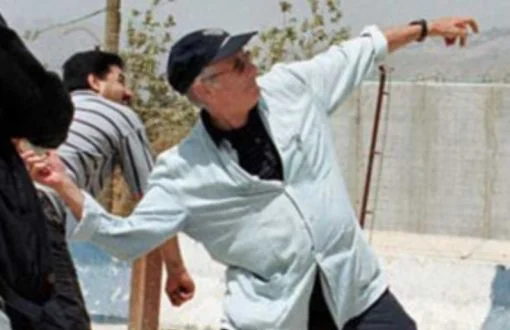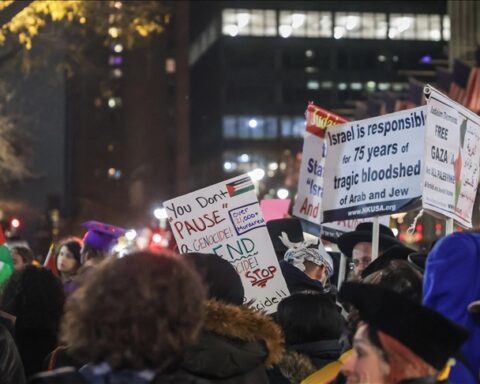Unmasking Fascism: Edward Said’s Pedagogy of Wakefulness in an Age of Educational Repression
The War at Home—State Terrorism on Full Display
Across the globe, we are living in a moment of profound crisis where the very essence of education as a democratic institution is under attack. In the United States, the assault on higher education is part of a broader war waged by authoritarian forces aiming to dismantle the pillars of not only academic freedom, dissent, and human rights, but also the essential foundations of democracy itself. Universities are no longer seen as spaces of intellectual freedom and critical inquiry but as battlegrounds for ideological control. Campus protests are met with police brutality; students are abducted for their political views, and those who dare to speak out against the prevailing orthodoxy face expulsion, censorship, and criminalization. Trump’s administration has fueled this campaign, not only targeting academic freedom but also pushing policies that criminalize dissent, especially when it comes to movements like those advocating for Palestinian liberation. The erosion of civil liberties extends to international students protesting in solidarity with Gaza, with threats of deportation looming over them. The chilling message is clear: higher education is no longer a sanctuary for free thought; it is a field of repression where the rule of authoritarianism dominates.
State terrorism at home targets those who dare to engage in the dangerous practice of critical thinking and the courageous act of holding power accountable. It is a violent apparatus that imposes terror on all who are deemed “other”—immigrants, Black people, trans people, brown people, campus protesters, and anyone who refuses to conform to the narrow, racist vision articulated by Stephen Miller, the White House deputy chief of staff. He is notorious for his white nationalist views, has become a central figure in shaping the Trump administration’s policies. At a Trump rally in Madison Square Garden, he boldly declared that “America is for Americans and Americans only,” a mantra that echoed the Nazi slogan, “Germany for Germans only.” As Robert Tait reports in The Guardian, Tara Setmayer, a former Republican communications director on Capitol Hill, warns that his rise is a direct threat, as he now wields the power of the federal government to impose his fascist worldview.
Setmayer, who now leads the women-led political action committee Seneca Project, explains that his vision has been fully embraced as a core political strategy under Trump. “That view has now been transformed into the main political policy and aim of Donald Trump’s presidency,” she states. The demagoguery surrounding immigration has always been at the heart of Trump’s political ascent. With Miller’s goal to make America whiter and less diverse now backed by the unchecked power of the presidency, Setmayer warns that this combination is not just dangerous, it poses a grave threat to American values and the rule of law itself.
Under the Trump rule, state terrorism is not confined to domestic borders; it extends its reach through reckless, international aggression. Trump’s administration is waging war not just within the U.S., but abroad, with flagrant violations of international law. His unprovoked aggression against Iran, coupled with his unwavering support for Israel’s genocidal campaign in Gaza and its unthinkable war on children, exemplifies the regime’s disregard for global norms and human rights. Beyond the Middle East, Trump’s regime seeks to impose its will through threats, tariffs, and naked displays of power. His brutal crackdown on immigration, the transformation of I.C.E. into a Gestapo-like force, and the relentless narrowing of who is permitted entry into the U.S. expose his deeper authoritarian impulses. In this vision, the international community becomes little more than a pawn in his relentless pursuit of geopolitical dominance.
Trump’s disdain for allies and international cooperation reached alarming heights, exemplified by his call to attack Panama, annex Canada, and seize Greenland. These wild, imperialistic notions reflect a deeply rooted belief that America’s might should dominate the global stage, with little regard for diplomacy or the sovereignty of other nations. In Trump’s worldview, global relations are defined by the logic of conquest and dominance, where the violence of state terror is justified by the expansion of America’s influence and control. This is a regime that knows no limits, expanding its machinery of fear and violence, both at home and across the globe, in a sustained assault on humanity, justice, and the most basic principles of international law.
The Scourge of Neoliberalism
The ongoing assaults on democracy, both domestically and globally, are not isolated events but part of the groundwork laid by gangster capitalism for the rise of fascism in American society. Central to this process is the transformation of the university from a public good to a privatized institution, where students are seen as human capital, courses are dictated by consumer demand, and more recently the curricula is whitewashed and filled with far-right propaganda, often under the cover of implementing patriotic education, cleansed of antisemitism. Under the market-driven logic of neoliberalism, universities have become spaces that prioritize economic outputs over intellectual autonomy, turning critical thought and democratic engagement into commodities. This shift has undermined the university’s role as a crucible for challenging the status quo, replacing it with a system of training rather than fostering a culture of critical learning, dialogue, and informed judgment.
As neoliberal policies encourage privatization, restrict access, and force institutions into service to corporate interests, the university is no longer seen as a public trust. It has become a tool for ideological indoctrination, training citizens to uphold the status quo rather than challenge it. This transformation, in part, is a direct response to the democratization of the university that reached its peak in the 1960s, with intellectuals, campus protesters, and marginalized communities seeking to broaden the educational mission. The assault on higher education as a site of critique and democratization has intensified over the last four decades with the rise of the far-right, with broader implications that include intellectuals, minority students, and critical formative cultures essential to the foundation of a substantive democracy.
As the South African Nobel Prize winner in literature, JM Coetzee, points out in a different context, the reactionary hedge-fund billionaires “reconceive of themselves as managers of national economies” who want to turn universities into training schools equipping young people with the skills required by a modern economy.” Coetzee’s words are even more relevant today, given that this attack on higher education, which is both ideological and increasingly dependent on the militaristic arm of the state, reflects a broader attempt to eliminate the university’s critical function. Rather than serving the public good, the university is increasingly framed as a private investment, or an arm of state repression, where its governance mirrors the merging of the exploitative practices of corporate models, such as Walmart’s labor relations and the governing principles of fascism. In the spirit of this concern, Coetzee advocates for the defense of education as an institution dedicated to cultivating intellectual insight, civic responsibility, social justice, and critical thinking.
The questions we must ask at this crucial moment in American history are not about how the university can serve market interests or the authoritarian ideologies of the Trump regime, but how it can reclaim its role as a democratic public sphere. How might we redefine the university to safeguard the interests of young people amidst rising violence, war, anti-intellectualism, authoritarianism, and environmental collapse? As Zygmunt Bauman and Leonidas Donskisastutely point out, “How will we form the next generation of intellectuals and politicians if young people will never have an opportunity to experience what a non-vulgar, non-pragmatic, non-instrumentalized university is like?” In this spirit, we must recognize how larger economic, social, and cultural forces threaten the very idea of education, especially higher education, at a time when defending it as a space for critique, democracy, and justice has never been more urgent. Moreover any defense of the university as a public good demands an alliance of diverse groups willing to recognize that the fight for higher education cannot be separated from the wider struggle for a socialist democracy. The threats being waged against higher education are also a threat to the nation, a culture of informed citizens, and how we think about agency and its fundamental obligations to democracy itself.
At the same time, as neoliberalism faces a profound legitimacy crisis, failing to deliver on its promises of prosperity and social mobility, it increasingly resorts to fascist rhetoric. This rhetoric scapegoats Black communities, immigrants, and dissenting students, blaming them for the deepening crises plaguing America. In doing so, neoliberalism shifts blame while reinforcing a narrative that justifies authoritarian measures, further marginalizing those already oppressed. As this rhetoric spreads, the very institutions meant to foster critical engagement—like the university—are further corrupted, their original role of challenging the status quo replaced with one of reinforcing the existing power structures.
Edward Said’s Pedagogy of Wakefulness -Dreaming the Impossible
It is within this oppressive context that Edward Said’s work gains renewed relevance, offering the crucial pedagogical framework for resisting authoritarianism and reclaiming higher education as a site of resistance. In opposition to the debased view of educational engagement promoted by the neoliberal agenda and far-right politicians, Said championed what I label as the “pedagogy of wakefulness.” This pedagogy emphasizes the need for intellectuals to remain vigilant, awake to the realities of power, work with an array of social movement, and actively engaged in resisting systems of oppression. Said’s pedagogy demands that education be used as a vehicle for social change, not simply as a means of economic productivity or ideological conformity. Moreover, he argued that cultural workers and all manners of engaged intellectuals work in a variety of sites and on different platforms in order to address the public in a language that was rigorous, accessible, and comprehensive in its ability to connect a variety of issues.
In defining Said’s pedagogy of wakefulness, I am reminded of a deeply personal passage from his memoir, Out of Place, where he reflects on the final months of his mother’s life in a New York hospital. Struggling with the ravaging effects of cancer, his mother asked him, “Help me to sleep, Edward.” This poignant moment becomes a gateway for Said’s meditation on sleep and consciousness, which he links to his broader philosophy of intellectual engagement. Said’s meditation moves between the existential and the insurgent, between private pain and worldly commitment, between the seductions of a “solid self” and the reality of a contradictory, questioning, restless, and at times, uneasy sense of identity. The beauty and poignancy of his moving commentary is worth quoting at length:
‘Help me to sleep, Edward,’ she once said to me with a piteous trembling in her voice that I can still hear as I write. But then the disease spread into her brain—and for the last six weeks she slept all the time—my own inability to sleep may be her last legacy to me, a counter to her struggle for sleep. For me sleep is something to be gotten over as quickly as possible. I can only go to bed very late, but I am literally up at dawn. Like her I don’t possess the secret of long sleep, though unlike her I have reached the point where I do not want it. For me, sleep is death, as is any diminishment in awareness. ..Sleeplessness for me is a cherished state to be desired at almost any cost; there is nothing for me as invigorating as immediately shedding the shadowy half-consciousness of a night’s loss than the early morning, reacquainting myself with or resuming what I might have lost completely a few hours earlier….A form of freedom, I like to think, even if I am far from being totally convinced that it is. That skepticism too is one of the themes I particularly want to hold on to. With so many dissonances in my life I have learned actually to prefer being not quite right and out of place.
Said’s reflection here is more than a personal meditation; This passage becomes a powerful metaphor for Said’s pedagogy of wakefulness. It is a call to remain in constant motion—intellectually, politically, and socially. The metaphor of sleeplessness, for Said, embodies a refusal to succumb to the seductions of conformity or passive consumption. This state of “wakefulness” requires intellectual vigilance, a refusal to settle for easy answers or unchallenged ideologies. It speaks to the necessity of embracing discomfort, of being “not quite right and out of place,” as Said himself puts it. In this intellectual space of uncertainty, a new, critical sense of identity can emerge—one that is always questioning, always in motion.
For Said, intellectuals–those who are alive to thinking critically and acting bravely–must engage critically with the world, confronting its injustices and inequalities, and using their positions to challenge power. His pedagogy insists that education is not merely about transmitting knowledge but about awakening students to the complexities of the world. It demands that we lift complex ideas into public discourse, recognizing human suffering and injustice both inside and outside the academy, and using theory as a tool for critique and change.
This pedagogy is particularly urgent in the context of the current Trump regime, where the state has weaponized ignorance and repression, seeking to silence dissent and erase marginalized histories. Said’s pedagogy of wakefulness provides a framework for resisting this intellectual and cultural erasure; what Marina Warner in a different context called “the new brutalism in academia.” By embracing Said’s vision, educators can transform their classrooms into spaces of radical engagement—spaces where students are encouraged not only to critique but to act, to connect their private struggles to the larger social issues that shape their world. This is particularly relevant in the fight for Palestinian liberation, where Said’s work has long offered a framework for resisting colonial violence and challenging the narratives that justify oppression.
In a time of rising civic cowardice in the mainstream media, elite education institutions, and cravenly law firms, hiding behind appeals to balance and objectivity makes it difficult for educators, journalists, public servants, and media pundits to recognize that being committed to something does not cancel out what C. Wright Mills once called hard thinking. More specifically, Mills argued “that social analysis could be probing, tough-minded, critical, relevant and scholarly, that ideas need not be handled as undertakers handle bodies, with care but without passion, that commitment need not be dogmatic, and that radicalism need not be a substitute for hard thinking.” Building on Said’s pedagogy of wakefulness “hard thinking” points to a pedagogy that needs to be rigorous, self-reflective, and committed not to the dead zone of instrumental rationality or the abyss of indoctrination, but what Gayatri Spivak calls “the practice of freedom,” to a critical sensibility capable of advancing the parameters of knowledge, addressing crucial social issues, and connecting private troubles and public issues.
The Role of Culture in Pedagogy: A Call for Resistance
In my own work, I have long argued that culture plays a crucial role in shaping the civic consciousness necessary for resistance. Culture is not merely a passive reflection of society; it is a dynamic force that shapes our understanding of the world and our place within it. In an era where neoliberalism and fascism are increasingly intertwined, culture becomes a vital space for alternative narratives to take root. It is crucial to acknowledge that culture has become a tool for authoritarian regimes to control public consciousness, suppress dissent, and maintain the status quo. However, it remains one of the few spaces where resistance can also flourish.
Said’s pedagogy of wakefulness offers a critical lens through which to view the role of culture in education. It calls on educators to resist the commodification and militarization of culture and instead cultivate a pedagogy that is engaged, critical, and rooted in the politics of resistance. This is not simply an intellectual exercise in critical thinking or a new found attentiveness about the rise of fascist politics, but a call to arms—an invitation to create a culture of resistance within the university and other cultural apparatuses, that equips students and the broader public with the tools to challenge the growing tide of authoritarianism.
This cultural resistance must be grounded in the belief that education is a public good, a space where the radical potential for social change can be realized, anti-capitalist values can be challenged, and the groundwork can be laid for mass resistance to an America marked by what the late Mike Davis, cited in Capitalist Realism, called “an era in which there is a super saturation of corruption, cruelty, and violence…. fails any longer to outrage or even interest.” Universities must reject the neoliberal redefinition of education as a commodity and instead embrace the idea that education is a moral and political practice, one that is central to the health of democracy. As Said argued, intellectuals and educators have a responsibility to bear witness to human suffering, to challenge power, and to use their positions to promote justice. In doing so, they can help reclaim education as a space for imagination, resistance, and liberation.
Conclusion
The current assault on higher education is not just an attack on academic institutions but on the very idea of humanity, thinking, and democracy itself. As universities become increasingly corporatized and ideologically colonized, we must resist the neoliberal and fascist forces that seek to transform education into a tool of indoctrination. Edward Said’s pedagogy of wakefulness provides a vital framework for this resistance, offering a vision of education that is both critical and politically engaged. By embracing this pedagogy, educators can help transform the university from a site of ideological compliance into a space where students are empowered to resist, imagine, and fight for a more just and democratic world. The struggle to reclaim education as a democratic force will determine not only the future of the university but the future of democracy itself.






